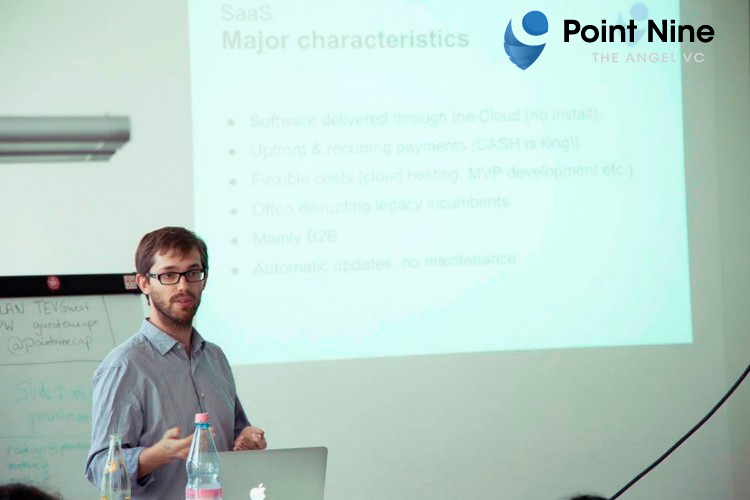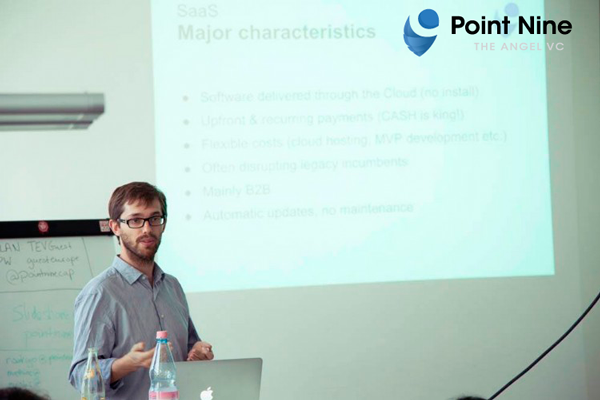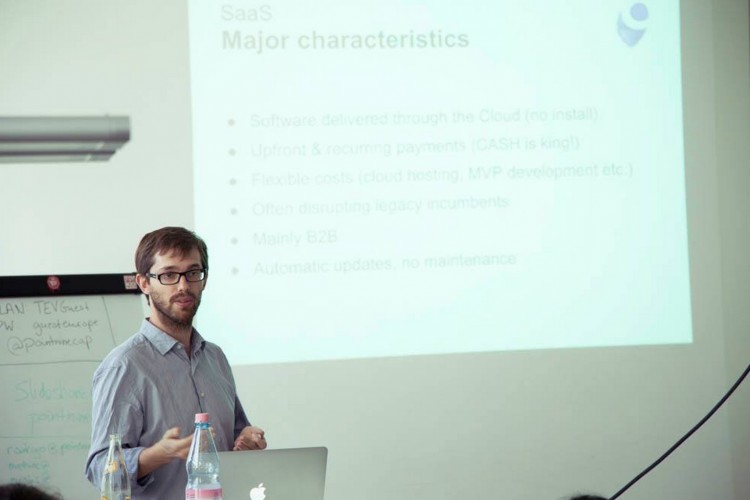Q&A with Rodrigo Martínez: Point Nine Capital, angel-VCs and Berlin’s ecosystem
Category: Interviews
investorsPoint Nine Capitalstartups
Point Nine Capital is an angel-VC fund that’s been quite active in recent months, having backed companies such as Helpling, Typeform, Brainly or Infogram.
To know more about the Berlin-based firm (don´t let the location fool you, they invest all over Europe and also in the US) we’ve interviewed investment associate Rodrigo Martínez.
For those who don’t know you: what’s Point Nine Capital and who is Rodrigo Martínez?
Point Nine is an angel-VC based in Berlin that invests in Software-as-a-Service, marketplace and mobile startups internationally
Point Nine
For us, being an ‘angel VC’ means that we invest early and we try to be as approachable, founder-friendly and supportive as an angel. But with the deeper pockets of a venture capital fund.
In practice that means we write initial checks between €300k and €1m and we spend a significant amount of our time supporting the companies in which we invest.
As for me, I am from Sabadell (Barcelona). I’ve always been motivated by understanding how technology could improve the lives of people. For that reason I studied telecommunications engineering and business administration. In my career, I’ve spent time advising corporates at a consulting firm, building tech for an angel-backed startup and lastly working with entrepreneurs at VC funds.
If I’m not mistaken you started off your career as an engineer. What made you change paths and join the business side of things in the VC industry?
I really enjoy building products, the process of finding a problem, envisioning a solution and finally “creating” – or developing, in most cases – a product. It’s very rewarding to me. It’s my passion and it’s my hobby – I still spend hours per week coding! But I like using tech to build great companies even better. That magic happens when high-performing teams work together towards a business goal.
After my experience in consulting and at a startup, I wanted to better understand how to excel at starting and growing a business. I did an MBA in London to learn the theoretical knowledge and I worked with top entrepreneurs – both at early and late stage startups – corporate entrepreneurship teams, and investors.
“Being an investor, you’re in a privileged role: you discover great opportunities, invest and support the entrepreneurs throughout their growth” Rodrigo Martínez
Being an investor, you’re in a very privileged role: you get to discover great opportunities and if you’re lucky (or deserve it!), you can invest in those companies and support the entrepreneurs throughout their growth. In London I worked for a late stage fund, but since I love to see how products evolve, I didn’t hesitate when Point Nine offered me the opportunity to be involved with early stage investments.
What’s Point Nine Capital investment criteria? In what kind of sectors or companies are you guys interested?
There are 3 aspects that we look for in a successful investment at an early stage:
- Is the opportunity big enough to build a very large business?
We focus on very large business opportunities because, as you know, most early-stage startups fail. Therefore, when we invest in a company that becomes successful, the opportunity created needs to be large enough to compensate for the failed investments and still generate enough returns for our investors.
That means we need to see opportunities in markets of hundreds/billions of euros, which usually means that the startups need to either go after several markets or take on a global scale.
- Is the team the right one to go after that opportunity?
At such an early stage, we are mostly investing in teams. The number one reason for success or failure is that team’s ability to make it real: to recruit and build the team, to develop the product, to attract customers, to close sales, etc.
We look for teams with execution skills we can have confidence in. That can be proven either by looking at their background or by what they achieved so far in their current venture.
- Are there any signs that this opportunity might work?
Traction, traction, traction… We understand that generating some meaningful traction requires a lot of resources, but what we mean with traction is an early validation of the market opportunity: Does the customer want this? How much does it cost to acquire the customer? How much are they willing to pay?
Since we only invest in business models we know inside out (especially SaaS, marketplaces and mobile), we think we can understand that early traction well. In most cases, what we expect to see is just one metric going in the right direction – and, by the way, that metric is usually related to engagement of customers/users.
What sets Point Nine Capital apart from other VC firms?
We invest very early, and we only invest very early. If you compare that with larger multi-stage funds, that means that we pay the same amount of attention to all of our companies, because we invest similar amounts of money in them. This also means that we have very limited signaling problems (ie. if you raise seed capital from a 100s of million euro fund and they don’t lead your series A, you might have a hard time raising it).
We are business model-driven, product-focused and numbers-affine. All those fancy words mean that if you have a SaaS, marketplace or mobile startup with some of users/customers who love you, we should speak because we might be able to invest even with limited traction.
We are very hands-on. Thanks to being focused on a limited number of business models and on early stage companies, we have seen many of the challenges faced by a new company of these types, so we can request the help of people in our network who already faced those challenges, etc. One key thing we try to do is to leverage our network, ideally, a startup we invest in becomes “smarter” by being plugged into that network.
We invest globally from our office in Berlin. Many of our companies have distributed teams, so for us, the location of a company is not a decisive factor. As long as you have a great opportunity in front of you and the ability to recruit great talent, you choose the best location for it. We do roughly 2/3 of our investments in Europe and 1/3 in North America.
So far, we only have one investment in Spain: the amazing typeform.com. But I hope this will grow, because I would love to escape the cold winter of Berlin more often.
Lots of accelerators (both corporate and not), established VC firms such as Index or Holtzbrinck raising very large funds, syndicate platforms, programs such as Seedcamp entering the investment space with specific funds. In your opinion, what are the key trends within the European VC/investment ecosystem?
At a macro level, the overall trend is that things are moving in Europe!
A couple of years ago, it sounded like a crazy idea to be smart, ambitious and well-educated and not willing to have a corporate career. Today we see these kinds of people leaving their corporate jobs to join or found companies; that’s very good news for the startup ecosystem in Europe.
This is one of the reasons why we are starting to see the first medium/large exits in Europe (just see what my colleagues at La Nevera Roja did). Thanks to these exits and the significant effort made by private and public actors, we are beginning to see some significant levels of investments in European startups.
In summary, the 3 key features of a healthy ecosystem are emerging: great entrepreneurs, access to capital and exits.
Some things need to improve: the access to “venture stage” capital (€5m+ rounds) is still limited, the regulatory environment can hurt startups a lot (e.g., Uber could never have been successful in Spain), Europe’s fragmented markets force many entrepreneurs to look at local rather than global opportunities, etc.
A lot has been written about Berlin in recent years. After seeing it evolve first hand, what do you think have been the key aspects in its development?
My experience in Berlin is still limited, so I will be speaking mostly about what I’ve heard and offer some of my thoughts.
My thesis on why startup ecosystems flourish is that initially you have a bunch of guys who are crazy, talented and ambitious enough to start a company in a place where nobody else wanted to do it – sometimes, that happens because there’s no other industry to work in, other times just because they like that place.
Their success attracts talent and capital – first on a local scale and then internationally. At some point, some of those talented guys, who got the experience of growing those companies, start the next ventures attracting more capital and accelerating the wheel. When exits appear, the ecosystem grows in a sustainable way.
“In Europe the 3 key features of a healthy ecosystem are emerging: great entrepreneurs, access to capital and exits” Rodrigo Martínez
That was the case in Berlin: due to the Cold War, industry disappeared and left Berlin “poor, but sexy” (as the mayor once said). You find those wild spirits at the roots of Rocket Internet, Team Europe, SoundCloud…
Not only that, Berlin is at a point today where we see all the dynamics of a healthy ecosystem at play: employees of those companies founding their own startups, expats moving to Berlin (I don’t speak German, and, surprisingly or not, it’s not a requirement to live in Berlin at all!), and even people who have never experienced Berlin before, moving to Berlin to start a company for the benefits of being part of that ecosystem.
Until recently, the only piece missing in Berlin were the exits, but we have recently started to see them – last year both Zalando and Rocket IPOed, and there are more to come.
Based on your experience, what advice would you give to other entrepreneurs that are currently looking for funding?
Raising money is a very painful process for an entrepreneur: very low chances, de-motivating, very time consuming, etc.
My #1 piece of advice is to be very narrow-focused and know the process (plenty of info online!). But what does it mean to be “narrow-focused”?
Choose your targets. It means that you should understand if your business is attractive for venture capital or not. You should also understand who the best investors are for your proposition in terms of business model, stage, geography, ambitions, etc. – please don’t pitch to us a late stage biotech company – and you should find how to best approach them (hint: get warm intros! check common connections through portfolio entrepreneurs, etc.)
Not being narrow-focused may mean too much effort for very low chances of raising money (worthless meetings and calls, expensive travel, etc.). The worst-case scenario is actually to raise money from the wrong investors, which might really hurt or even kill your business in the mid- term.
At Point Nine, we eat our own dog-food: we are narrow focused on early stage SaaS, marketplaces and mobile startups. If you’re working on something in these fields, please reach out to us!










